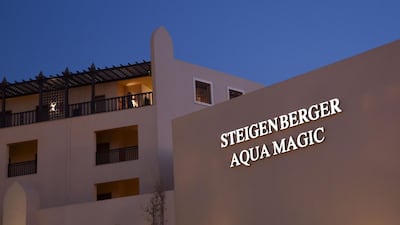The death of two British tourists in the Red Sea resort of Hurghada was not caused by poisonous gas, Egypt's top prosecutor has said.
The prosecutor's technical team inspected John and Susan Cooper's hotel room and found that there were no toxic or harmful gas emissions or leaks. All devices in the room were "functioning efficiently without any defects," the team said.
The statement followed an appearance on Sky News by the couple's daughter Kelly Ormerod in which she suggested that "something suspicious has gone on". The hotel, however, says the couple's death was due to "natural causes".
Ms Ormerod says her parents had not complained of any health problems before going on holiday.
The Cooper couple's deaths prompted tour operator Thomas Cook to evacuate its 301 customers, of various nationalities, from the Steigenberger Aqua Magic hotel as a "precautionary measure". The company said the circumstances surrounding their deaths are "unclear" and that it received reports of "a raised level of illness among guests".
"There are no indications to support allegations of an increased incidence of illness at the hotel. Such rash speculations should urgently be put aside out of respect for the family members of the deceased persons and for other guests", the Associated Press cited the hotel as saying.
Read more:
British couple die in Egypt from 'heart failure'
But other guests have complained of feeling unwell.
Jackie Elliott, 51, from Swindon, fell ill while staying at the hotel with her husband Gordon, 59, and daughter Lucy, 19, she told Sky News on Saturday.
She was taken to hospital after passing blood and being sick every time she ate something in the hotel. She said she was unsure whether her sickness was caused by food poisoning or something to do with the hotel room, such as the air conditioning.
Janette Rawning, a guest evacuated from the hotel who arrived in Manchester along with her family on Saturday, said she only learnt about the deaths two days after the incident happened.
"Thomas Cook kept it from us for two days," she told Independent Television News. "So despite their [the Cooper couple] being sickness, vomiting and illness in the hotel, we went in, started as normal our holiday."
"So any advice they could have given us for two days about avoiding food, being more careful, making sure the meat was cooked, or anything like that, they could have done loads of steps to mitigate any risks to us, and none was done at all. None. Nothing," she added.
Egypt's vital tourism industry has suffered the consequences of the country's political turmoil that ensued after a 2011 uprising that toppled long-time autocrat Hosni Mubarak. A 2015 ISIS bombing of a Russian passenger plane over the Sinai Peninsula, which killed all 224 people on board, was among several incidents that led to the decimation of the country's multibillion-dollar industry. Russia subsequently imposed a two-year-ban on all flights to Egypt.
Earlier this year, Russian flights to Cairo resumed, but flights to resort cities have yet to be decided upon.
Britain, another major source of visitors to Egypt, also suspended flights to Sharm El Sheikh, the popular Red Sea resort in Sinai from which the doomed Russian airliner took off shortly before it crashed.
The government has gone to great lengths to bolster the sector by launching tourism campaigns, touting new archaeological discoveries, boosting security around historical sites and stepping up security at airports.

